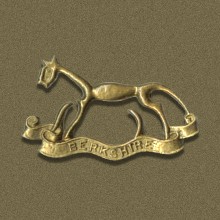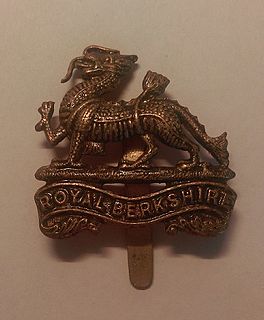 W
WThe 5th Anti-Aircraft Division was an air defence formation of Britain's Territorial Army, created in the period of tension before the outbreak of the Second World War. It defended Southern England during the Battle of Britain and the Blitz.
 W
WThe Berkshire Yeomanry was an auxiliary regiment of the British Army formed in 1794 to counter the threat of invasion during the French Revolutionary Wars. It was the Royal County of Berkshire's senior volunteer unit with over 200 years of voluntary military service. After taking part in the Second Boer War, it saw action as mounted troops in the First World War and as artillery in the Second World War. Its lineage is maintained by 94 Signal Squadron, part of 39 (Skinners) Signal Regiment. The Headquarters of the Squadron is based in Windsor, Berkshire. The Berkshire Yeomanry had a number of battle honours won from Europe to the Far East and Private Frederick Potts was awarded a Victoria Cross for service during the Gallipoli Campaign.
 W
WThe Berkshire Yeomanry was an auxiliary regiment of the British Army formed in 1794 to counter the threat of invasion during the French Revolutionary Wars. It was the Royal County of Berkshire's senior volunteer unit with over 200 years of voluntary military service. After taking part in the Second Boer War, it saw action as mounted troops in the First World War and as artillery in the Second World War. Its lineage is maintained by 94 Signal Squadron, part of 39 (Skinners) Signal Regiment. The Headquarters of the Squadron is based in Windsor, Berkshire. The Berkshire Yeomanry had a number of battle honours won from Europe to the Far East and Private Frederick Potts was awarded a Victoria Cross for service during the Gallipoli Campaign.
 W
WThe Berkshire Yeomanry was an auxiliary regiment of the British Army formed in 1794 to counter the threat of invasion during the French Revolutionary Wars. It was the Royal County of Berkshire's senior volunteer unit with over 200 years of voluntary military service. After taking part in the Second Boer War, it saw action as mounted troops in the First World War and as artillery in the Second World War. Its lineage is maintained by 94 Signal Squadron, part of 39 (Skinners) Signal Regiment. The Headquarters of the Squadron is based in Windsor, Berkshire. The Berkshire Yeomanry had a number of battle honours won from Europe to the Far East and Private Frederick Potts was awarded a Victoria Cross for service during the Gallipoli Campaign.
 W
WThe No 1 School of Military Aeronautics was a World War I training school for the Royal Flying Corps (RFC), based in Reading, England. It was formed in 1915 as an instructors college - but expanded in 1916 into a full RFC training school. In 1917 technical skills were separated and moved to a nearby airfield, Coley Park, as the School of Technical Training. All training at the school was on the ground; ranging from theoretical subjects through to practical training.
 W
WThe Berkshire Yeomanry was an auxiliary regiment of the British Army formed in 1794 to counter the threat of invasion during the French Revolutionary Wars. It was the Royal County of Berkshire's senior volunteer unit with over 200 years of voluntary military service. After taking part in the Second Boer War, it saw action as mounted troops in the First World War and as artillery in the Second World War. Its lineage is maintained by 94 Signal Squadron, part of 39 (Skinners) Signal Regiment. The Headquarters of the Squadron is based in Windsor, Berkshire. The Berkshire Yeomanry had a number of battle honours won from Europe to the Far East and Private Frederick Potts was awarded a Victoria Cross for service during the Gallipoli Campaign.
 W
WThe Royal Berkshire Regiment was a line infantry regiment of the British Army in existence from 1881 until 1959. The regiment was created in 1881, as the Princess Charlotte of Wales's , by the amalgamation of the 49th (Hertfordshire) Regiment of Foot and the 66th (Berkshire) Regiment of Foot. In 1921, it was renamed the Royal Berkshire Regiment .
 W
WThe Berkshire Yeomanry was an auxiliary regiment of the British Army formed in 1794 to counter the threat of invasion during the French Revolutionary Wars. It was the Royal County of Berkshire's senior volunteer unit with over 200 years of voluntary military service. After taking part in the Second Boer War, it saw action as mounted troops in the First World War and as artillery in the Second World War. Its lineage is maintained by 94 Signal Squadron, part of 39 (Skinners) Signal Regiment. The Headquarters of the Squadron is based in Windsor, Berkshire. The Berkshire Yeomanry had a number of battle honours won from Europe to the Far East and Private Frederick Potts was awarded a Victoria Cross for service during the Gallipoli Campaign.